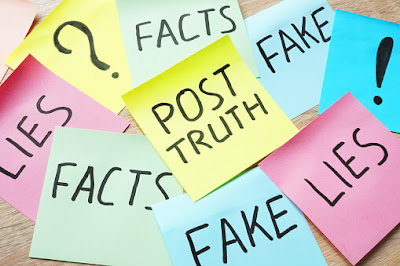Hello! In my blog today, I will be discussing what the Illusory Truth Effect is, implications of it, and the meaning of it not just to me, but society as a whole.
To begin, what is the Illusory Truth Effect? The Illusory Truth Effect (which is also known as the validity effect, truth effect, or illusion of truth effect) is an occurrence in which the repetition of a statement increases the belief that information is true even when it is false. The effect was first recognized in the 1977 study that took place at Temple University and Villanova University.
So why does the effect work? Reported by KUB's article, psychologist Lisa Fazio of Vanderbilt University explained that after hearing information a second and third time, your brain misinterprets the repetition as a signal for it being true. The fluency and frequency of the information you hear translates into a gut-feeling of truth.
I found this video from Veriasium to be explanatory and quite interesting regarding the Illusory Truth Effect, give it a watch! :
So, I've just defined this piece of information, why does it matter? It matters because believe it or not, you may be a victim of it daily through specifics such as company marketing techniques, politics, mass spread social media, and many other outlets in which the effect prevails. In simpler terms, The Illusory Truth Effect is also known as "fake news". This is in fact relevant to all of us given the dangers of it. A notable example of the effect most recently can be observed through fake news being spread about the COVID19 virus. Our information outlets heavily depend upon information outlets to provide us with accurate and well-presented information for the benefit of our safety but unfortunately, this has not remained consistently true. As seen in a study done by the British Medical Journal, 1 in 4 YouTube videos about the virus presented "inaccurate or misleading information". Put this in perspective - the world still has yet to fully understand the entirety of this virus, let alone when it will end, (if it will end) and our information outlets have provided misleading or false information. That's pretty alarming. Sure, people may agree that YouTube is not their most reliable source of information, but it is still a source and people obviously still believe the content. This is seen almost every day through how misinformation that goes viral via social media can lead to conflict and/or harm. As highlighted in KUB's article, "The Illusory Truth Effect On Social Media", the mass spread of misinformation has caused such a large problem that the UK government has announced the reveal of an anti-fake news unit to mediate the problem.
Of course, this issue is prevalent to essentially all of society but specifically my generation. While certain social media outlets such as Twitter, Instagram, TikTok, Snapchat, and many more have specifically taken a rise within my generation, we could definitely be responsible for the publishing of fake news. TikTok and Instagram appear to be the most popular social media at the moment, and it is easier than ever to post your thoughts, feelings, and any other information. ANY other information. There is no "filter" for false information that just removes posts from the internet at any time unless another individual reports it and becomes reviewed to be removed. With certain actions within the apps of those social media such as "reposting" or "sharing" the Illusory Truth Effect comes into play because of the fact that individuals are being exposed to the same repeated, shared information thus convincing the person to believe the information is true. Repetition is often confused for validity.
Ultimately, because our generation has the most insight into the most recent inventions of popular social media, we have the most knowledge about popular post trends and how to spend information through that popularity whether it be real or fake.
Now that we've covered that this is a prevalent issue that affects people- what segments of people does it affect specifically? Given that the majority of the world's population has access to various forms of technology, this is an issue that affects virtually everyone. Say you don't even own a phone or own a laptop, there is a fair chance that someone you know does or has had exposure to repeated, false information provided from that technology and has discussed, shared, and ultimately spread it. Without even owning technology, you've been exposed to the virus of fake news. Suppose you walk away from your source of exposure unable to research whether or not the presented information is true or not, you're going to believe it right?
The takeaway: next time major information breaks, make sure to do your research before you click repost. Help stop the spread of the fake news pandemic!
https://www.apa.org/pubs/journals/features/xge-0000098.pdf
https://www.kub-uk.net/insights/illusory-truth-effect/
https://www.psychologytoday.com/us/blog/psych-unseen/202001/illusory-truth-lies-and-political-propaganda-part-1
https://thedecisionlab.com/biases/illusory-truth-effect/





No comments:
Post a Comment